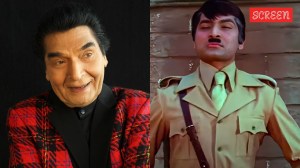The new presidential shift
I for one prefer the new mode used by the President to address the nation on August 14 -- a conversation with a journalist.A monologue ca...

I for one prefer the new mode used by the President to address the nation on August 14 — a conversation with a journalist.A monologue can become quite dreary and even an orator like Atal Behari Vajpayee falls flat when he is delivering a written speech on TV.
Today people are tired of exhortations by politicians and there is nothing wrong in devising new methods to engage their interest. We are after all in an era of soundbites and over half the country’s population is made up of young people who have no patience with long speeches.
The criticism of the President’s decision to give an interview stems from the belief that he should reflect only the policies and thinking of the government. As for his own views,he can express them when he writes his memoirs after retirement.
The President’s August 15 and January 26 speeches are his own. Unlike his address to the joint session of parliament, they do not reflect the government’s policy. Narayanan’s "conversation" with N. Ram steered clear ofcontroversies.
The President’s powers vis-a-vis the government are now pretty well settled. The 42nd Constitution Amendment by Indira Gandhi removed any ambiguity there might have been that he is bound by the advice of the Council of Ministers, and this was not changed by the Janata Government.
The President can send back a decision to the Union Cabinet for reconsideration or refer a Bill back to parliament for review but he has to give his assent if these are sent back to him. His discretion lies in appointing the prime minister and this is becoming an important area with coalition politics.
To say that all the functions of the President depend on the advice of the council of ministers is to interpret the Constitution mechanically. The Rashtrapati is expected to guide the nation and the government. Rajendra Prasad used to give advice to Nehru’s Cabinet frequently before a decision was taken just as he would go by its advice — and yet remain within the Constitutional parameters.
He sent a note tothe Cabinet that its size should be curtailed and that people should not be made ministers to placate power seekers. It is well known that Prasad prevented the Hindu Code Bill from being passed. He even made changes in his address to the joint session of the two Houses.
K. R. Narayanan has laid down several new conventions since he took over.He was the first President to go and vote in the general elections. All his predecessors had shied away from it because they did not want to be seen to be expressing a preference for a party,even though it was not made public.The flip side is that the President is also a citizen and there is something to be said for the first citizen of the Republic queuing up to exercise his democratic right, underscoring the principle of equality before law and the import of the vote.
The vital question is not that he has a political view — of course, the President must have a view — but that it does not interfere with the decisions he is called to make. Since 1950,Presidentswere members of a political party till they came to occupy the exalted position.
The Lok Sabha Speaker is similarly expected to function impartially even though he continues to be a member of a political party. In the case of a tie in the house, he can vote.
No doubt, conventions provide a continuity and should not be tampered with because they can be the open sesame to future incumbents who may not be sticklers to constitutional propriety. Change tends to evoke a sense of nervousness today,given the fragility of the polity, the downslide in public standards and the experience of the Emergency.
But this does not mean there should be no change — provided the President’s actions remain within the four corners of the Constitution. Rajendra Prasad broke convention when he decided to confer the Bharat Ratna on Nehru without clearance from the Cabinet, and admitted as much. R. Venkataraman went to receive Rajiv Gandhi at the airport when he returned home following the attack on him in Colombo. The thenPresident broke established convention of not receiving a prime minister at the airport in order to express the nation’s solidarity with him.
Narayanan is turning out to be an unconventional President — though this does not mean he is an activist head of the state. His decision to send back the Cabinet’s recommendation for President’s rule in UP cast him in this mould, though Zail Singh had also returned the mail interception Bill back to the government for reconsideration.
Narayanan is clearly taking a leaf out of Rajendra Prasada’s book. The first Rashtrapati was clear that if the President did not get an opportunity of influencing the decisions of the Cabinet, if required, before they were made, he would become an "ornamental figurehead without the authority of the hereditary King and a costly nonentity".
But the nineties are very different from the fifties. Narayanan is clear that a President will not be able to influence indirectly the decisions of the government today without public backing. Howmuch support the President gets depends on his stature, commitment to the Constitution and credibility.





- 01
- 02
- 03
- 04
- 05

























